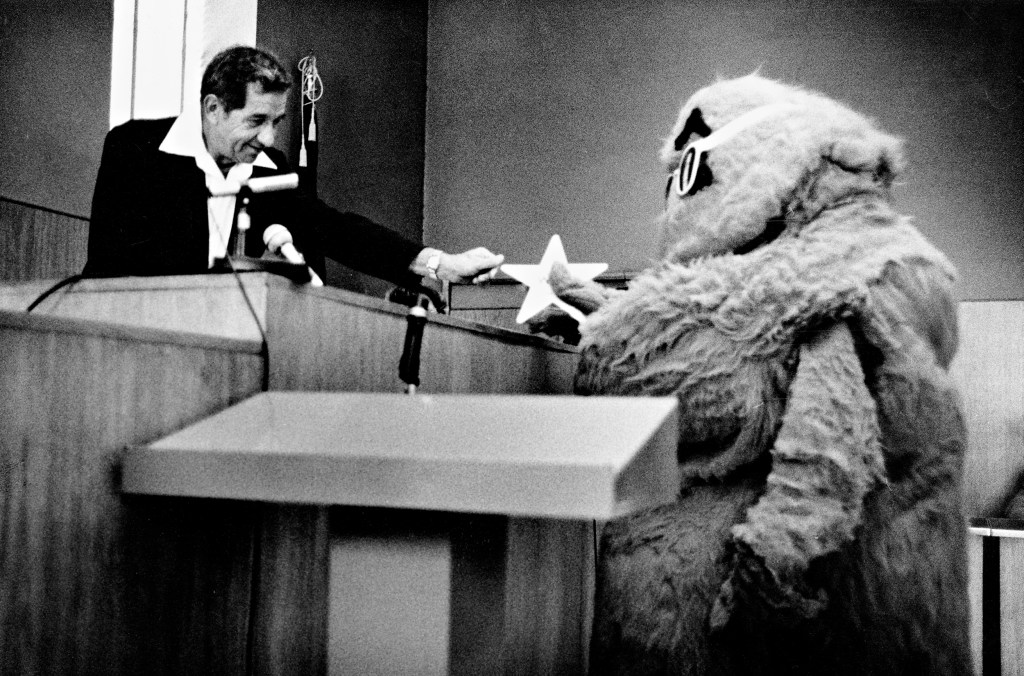Underwood family, Natcher were giants in local politics
Published 4:45 pm Thursday, September 13, 2012

- Warren County Sherriff Basil Griffin appointing Big Red honorary deputy sheriff in 1980. (Photo Courtesy of WKU Archives)
In 19th century Bowling Green, the Underwood family was the closest thing to a political dynasty.
Joseph Underwood, an attorney and jurist who served in the U.S. Senate, U.S. House of Representatives and Kentucky House of Representatives, could be considered the patriarch of the dynasty.
Considered to be the first important political figure to have come from Bowling Green, Underwood was recognized by Kentucky historians Nancy Baird and Carol Carraco as “Warren County’s best known 19th century resident” in a bicentennial history of Warren County compiled in 1999.
Born in Virginia in 1791, Joseph Rogers Underwood moved to Barren County as a child to live with his uncle, attended Transylvania University and saw action with the U.S. Army in the War of 1812 before moving in 1823 to Bowling Green, where he practiced law.
Underwood’s political career started at a young age when he began serving in the state legislature in 1816, in a stint that would last for three years. He would return as a state representative on two later occasions, serving in Frankfort from 1825-26 and from 1861-63.
In between his second and third stints as a state representative, Underwood served as a judge on the Kentucky Court of Appeals from 1828-35.
Although he inherited slaves from relatives, Underwood would become a strong abolitionist, forcefully advocating for slaves to be freed and allowed to colonize in Africa.
“The object of our society is, to restore them to the land of their forefathers, by planting colonies on the shores of Africa,” Underwood said in a July 4, 1832, address delivered before the Colonization Society of Bowling Green. “There is a moral grandeur in the subject, suited to the splendid associations of (Independence Day).”
In 1850, Underwood arranged for a slave named Davy, his wife and their two children to sail for the African nation of Liberia, providing the family with farming tools, seeds, cooking utensils, coffee, sugar, clothing, food and money among other provisions.
“Davy’s family and 17 other newly freed slaves from Kentucky sailed from New Orleans to Liberia in March of 1850,” Baird and Carraco wrote.
Underwood moved from the courtroom to Congress, serving in the U.S. House of Representatives from 1835-43 as a member of the Whig Party, and was later elected to the U.S. Senate as a Whig, serving from 1847-53, when he declined to seek a second term.
In a recent interview, Baird said that Underwood kept in regular touch with his wife, Elizabeth, during the second half of his Senate term after she moved back to Bowling Green with their four children.
The couple exchanged letters frequently in those years as Elizabeth Underwood ran the household, and she appears in her correspondence to be well-informed on the issues of the day, Baird said.
“She tells him what she thinks about some of the speeches he gives, she tells him how to vote,” Baird said. “He doesn’t always vote the way his wife thinks he ought.”
Underwood voted in favor of the Compromise of 1850, a wide-ranging act that admitted California as a free state, abolished the slave trade in Washington, D.C., strengthened the Fugitive Slave Act and ordered Texas to give up claims to land that would become part of New Mexico.
The compromise was struck between pro- and anti-slavery factions among federal lawmakers and is considered by Baird and other historians as something that prevented the Civil War for a decade.
Baird said Underwood was highly respected in Bowling Green, and that respect was manifested in 1868 at the opening of a new courthouse in Warren County.
“He was given the honor of pleading the first case,” Baird said.
A bank trustee, Underwood was affected by economic panic that set in in the early 1870s.
“He felt responsible for some of those people who lost money, and his fortune somewhat goes down the drain in the process of helping these people,” Baird said.
Underwood died in 1876 in Bowling Green and is buried in Fairview Cemetery.
His brother, Warner Underwood, was a state representative from Bowling Green and served in the U.S. House of Representatives as a member of the American Party from 1855-59.
An attorney who also practiced in Bowling Green, Warner Underwood lived for a few years in Texas, serving as attorney general for the eastern district of Texas, and practiced law for a short time in San Francisco in the mid-1860s.
Despite being an outspoken opponent of Abraham Lincoln, Warner Underwood’s political career was marked by his appointment to the U.S. Consulate in Glasgow during the Lincoln administration, serving in Scotland from 1862-64.
“He’s out there, in essence, spying on shipbuilding efforts, ships being built for the Confederates,” Baird said.
Equally passionate against secession as he was against Lincoln, Warner Underwood’s home was commandeered by Confederate troops in 1862 during the short-lived confederate occupation of Bowling Green, forcing him to flee with his family to Allen County.
The Confederate soldiers torched the home as they were driven out of Bowling Green by Union troops.
Warner Underwood resumed his law practice in Bowling Green in 1866 and died in 1872 at age 63.
Joseph Underwood’s son, John Cox Underwood, served as mayor of Bowling Green and was lieutenant governor of Kentucky from 1875-79, and Joseph’s grandson, Oscar Underwood, served as a U.S. congressman from Alabama from 1895 to 1915, as a U.S. senator from 1915-27 and ran for the Democratic nomination for president in 1912 and 1924.
William H. Natcher
If the respect that someone earns can be measured by who speaks at that person’s funeral, then William H. Natcher was paid the ultimate compliment when the president of the United States eulogized him 18 years ago.
“He found a way to live in Washington and work in politics and still be exactly the way he would have been if he’d been here in Bowling Green running a hardware store,” President Bill Clinton said at the longtime congressman’s funeral on April 6, 1994, at Eastwood Baptist Church. “And this country works well when people in Washington treat each other the way they would have to treat each other if they were living in Bowling Green.”
Born in Bowling Green in 1909, Natcher would become a fixture in Congress, serving in the U.S. House of Representatives from 1953 until his death on March 29, 1994, at age 84.
His congressional tenure was marked by dual accomplishments that would seem unfathomable in the present-day environment of federal politics – he cast 18,401 votes in a row, a streak broken only when Natcher became too ill to travel from Bethesda Naval Hospital late in life to the U.S. Capitol to vote on the House floor, and he never accepted financial contributions for any of his campaigns, self-financing his re-election efforts at meager expense.
“I don’t know if anybody can do that today unless they’re really wealthy,” said state Rep. Jody Richards, D-Bowling Green.
Nearly all of Natcher’s adult life was devoted to public service in some form.
After graduating from Western Kentucky University in 1930, Natcher earned his law degree from Ohio State University in 1933 and began practicing law in Bowling Green the following year.
His political ascent began with his election as Warren County attorney, serving in that office from 1938-50, a time period that included service in the U.S. Navy during World War II.
Natcher was then elected commonwealth’s attorney, prosecuting felony cases in Warren County from 1951-53, when he was chosen in a special election to fill the congressional seat of Garrett Withers, who died in office.
As a federal lawmaker, Natcher advocated for highway improvements and road construction in his congressional district, which included Bowling Green and Owensboro among other cities, leaving a legacy that includes the William H. Natcher Parkway between those two cities and the bridge spanning the Ohio River at Owensboro that also bears his name.
Natcher racked up a lot of miles on the highways of his district, traveling in his personal car to meet with his constituents when he wasn’t in Washington, D.C.
“The people of the district and the Commonwealth were fortunate in having someone up there who was really theirs,” said Jack Eversole, then-executive director of the Barren River Area Development District, in a story reporting Natcher’s death in the March 30, 1994, Daily News.
Natcher’s work ethic while in Congress received special recognition, culminating in his being named chairman of the powerful House Appropriations Committee in his last term.
When he was present for his 10,000th consecutive vote in 1978, the occasion was marked by the Guinness Book of World Records.
The voting streak was maintained as Natcher traveled back and forth from Washington, D.C., to Kentucky to visit his ailing wife and later, when illness hospitalized Natcher, he would be brought to the House floor in a wheelchair and later a gurney to cast votes until he became too sick to continue.
Natcher refused to take any contributions from individuals, businesses or political action committees for any of his campaigns, never spending more than $9,000 on any of his re-election bids.
“I admired the congressman very much, he was the epitome of moral rectitude and he always looked like a congressman,” Richards said. “He wore those starched white shirts, and he would change those a couple times a day. He always looked impeccable, and I think that was a symbol of the way he tried to represent the people of his district.”
Rep. Jody Richards
From a career in teaching to a long tenure as a state legislator, Rep. Jody Richards has built a legacy of championing education in Kentucky.
The Bowling Green Democrat was on the faculty of Western Kentucky University’s journalism department when he decided he wanted to improve the state’s educational system through another avenue.
“I was motivated by a desire to better fund education and to help increase interest and promote the quality in public education in Kentucky,” Richards said in a recent interview about his initial foray into politics. “I come from a family of teachers, and I just felt that educational improvement was really important, and I had been teaching, and I saw the need firsthand.”
Richards won election in 1975 to the Kentucky House of Representatives in the 20th District, and state law at the time prohibited legislators from teaching at a public-supported institution at the same time, so Richards, now 74, left his position at WKU and embarked on a legislative career that has seen him help usher in sweeping reforms.
He is Kentucky’s longest-serving speaker of the House, completing a 14-year run in 2009, and he ran twice for his party’s nomination for governor.
But it was a court case in 1989 that cemented Richards’ legacy.
That year, 88 Kentucky school systems joined in a lawsuit against the state in which they claimed that the state’s educational system was unconstitutional.
The school systems focused their argument on a statement in the state constitution that Kentucky shall provide an efficient system of common schools.
“There was such a disparity at that time in the amount of money that was spent on a child in some counties as compared with the amount of money in property-richer communities,” Richards said. “The state was spending more than three times on some schoolchildren than it was on others.”
The Kentucky Supreme Court declared the educational system unconstitutional and mandated that the legislature reform the system.
Richards co-chaired one of the committees that drafted what would become the Kentucky Education Reform Act.
“What we decided to do at that time was not only change the method of funding, but to look at areas where we thought education could be improved, so we came up with KERA,” Richards said.
Richards’ work in the legislature was rewarded by his colleagues when he was named majority caucus chairman for the Democrats in the Kentucky House in 1987, and he was named speaker of the House in 1995.
“It was certainly an opportunity to do some things that I thought were important to make the state better and improve our community,” Richards said. “I think the great thing about Bowling Green is that community leaders, public and private, work together better than any place I know.”
Richards points to being able to direct funding and resources to WKU and to Bowling Green as a highlight of his tenure as speaker.
His commitment to education was recognized with the dedication of Warren County’s newest elementary school in his name this year.
“It was very rewarding, that period of time, in terms of being able to build Kentucky and certainly build Bowling Green or help build it,” Richards said.
Basil Griffin
For making sure the county’s finances did not wind up deeply in debt, Warren County leaders owe a debt of gratitude to Basil Griffin.
One of the longest-tenured officeholders in local politics, Griffin was Warren County judge-executive from 1962 to 1993, when he retired.
A native of Henderson, Griffin moved to Bowling Green in 1945 after serving in World War II, during which he received a Bronze Star and a Purple Heart.
Griffin attended Western Kentucky University and Cumberland University and would be elected city police judge in 1956, serving in that position for five years until he was voted into the position he would hold for 31 years.
When he retired, community leaders remembered Griffin as a steward of the county’s finances, often maintaining a budget surplus of $5 million to $9 million over the years, even as the county’s infrastructure and population grew.
In a Nov. 22, 1992, Daily News story, Warren County Sheriff Jerry “Peanuts” Gaines spoke about the sometimes charming, sometimes irascible county judge-executive.
“People stay after Judge Griffin a lot, but we are one of the richest counties in Kentucky and I don’t think we could have had a better man to run the county,” said Gaines, who was a magistrate on the Warren County Fiscal Court under Griffin before being elected sheriff. “We have water lines to every house that wants them and more blacktop roads than any other county, we have a new jail and a new justice center, I could go on and on.”
Those remarks came in the wake of Griffin’s announcement that he would not seek re-election.
Griffin did not publicly endorse either of the candidates who ran to succeed him in the election that would be won by current Judge-Executive Mike Buchanon.
When Griffin died in 1997, Buchanon reminisced on the friendly relationship he had with Griffin despite the two men being in competing political parties.
“I don’t think people realized how good he was to me,” Buchanon said in a story that appeared in the Jan. 14, 1997, Daily News.
Kentucky judges-executive now have a function in government that could be compared to a CEO in a business, but in bygone years, they also had duties as a judge of the law.
Griffin’s tenure and duties as judge-executive also encompassed being the Warren County Juvenile Court judge from 1962-78, when those responsibilities were transferred to the state justice system.
Griffin referred to his experience as juvenile court judge as “a great period in my life.”
“I’d like people to remember I made every effort to help the people of the community, especially the young people,” Griffin said in a May 27, 1993, Daily News story.
Griffin was also known in the community to provide summer jobs to high school and college students. One of his former summer youth employees, Amy Hale, is now Warren County Attorney Amy Hale Milliken. Another, Nancy VanArsdale, is now Dr. Nancy VanArsdale Morris, who practices internal medicine in London, Ky.
That commitment to youth was expressed in Griffin’s leadership role in developing the county’s parks system, a commitment that was recognized in 1987 when Three Springs Park was renamed Basil Griffin Park.
Griffin deflected credit for his accomplishments in that respect, frequently saying that the magistrates of the Fiscal Court shared the responsibility for building up the parks system and the rest of the county.






